The benefits of a hot bath are a fact that perhaps everyone knows about. However, taking a hot bath may have more powerful positive effects on your health than you first think. A good bath has unexpected effects on the human body. Let's find out all the positive aspects of taking hot baths!
Improved blood circulation
Immersing the body in hot water is a good exercise for the blood vessels. The fact is that water exerts physical pressure on the body, which improves the abilities of the heart. In other words, when we dive into water, the heart begins to work harder.
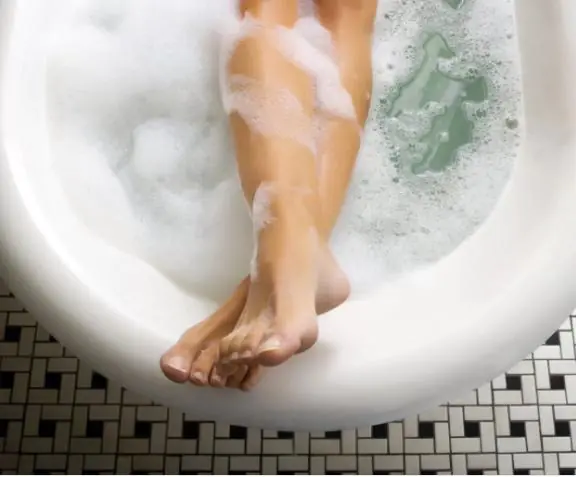
Moreover, this is more like a light exercise than a serious load. Taking a few hot baths a week is a great workout for your cardiovascular system. The benefits of a hot bath for the body are difficult to overestimate!
Strengthens sleep
Hot water promotes relaxation of the body, which is so necessary for healthy sleep. When a tense body is immersed in a warm bath, the hot water increases its temperature and relieves fatigue from the muscles. The benefits of a hot bath are invaluable for those who want to relax at the end of the working day, not only physically, but also psychologically.
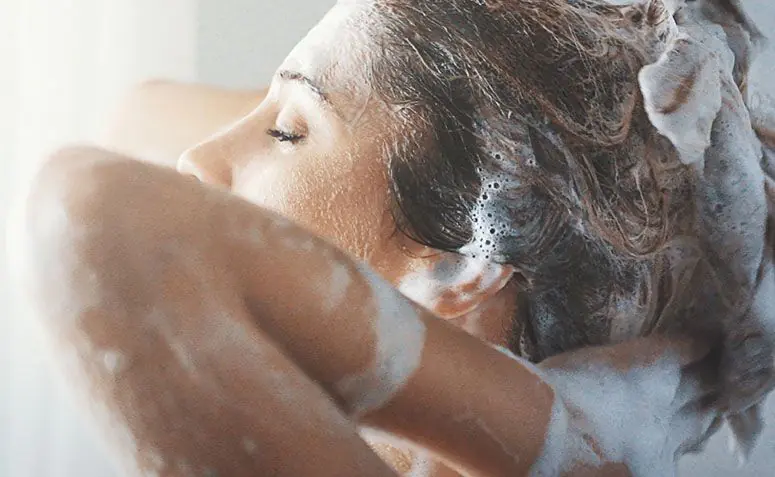
However, it is important to remain careful not to fall asleep in the bath: limit your time in hot water to 20 minutes.
Treatment of injuries
Among other things, such procedures relieve muscle pain, help reduce pain from sports injuries and heal aching joints. Overall, the benefits of a hot bath after physical activity are impressive.

In fact, water temperature helps reverse the effects of conditions such as osteoarthritis without causing worsening symptoms or any other adverse effects.
Lower blood pressure
Doctors' studies show that a hot bath can help lower blood pressure to healthy levels. This treatment method is ideal for people with heart disease who need to monitor their blood pressure. However, you should consult your doctor before undergoing the procedures, as a hot bath will also increase your heart rate.
Weight loss and sugar reduction
People suffering from diabetes know the benefits of a hot bath: regular immersion in high-temperature water can lower blood sugar levels. In addition, 6 dives of 20-30 minutes per week will help you lose up to 2 kilograms.
Skin cleansing
Let a shower be considered more hygienic than a bath. But hot water steams the skin and opens the pores, cleansing them of dirt and toxins. The result is fresher, cleaner skin.
Reduce headaches
Most types of headaches are caused by narrowing of blood vessels in the head. The positive effects of hot water on our blood vessels can be used to relieve pressure and treat headaches.
Relaxation
Life is busy, and a hot bath can be a shoulder to cry on. It is known that if we feel physically better, then confidence increases. A hot bath is a great way to reduce daily anxiety.

Therefore, the benefits of a hot bath for men are invaluable. They are known to be more anxious by nature than women. You don't have to completely immerse yourself to relax. The effects and benefits of a hot foot bath are approximately the same!
Help treat cough and flu symptoms
The steam from a hot bath can loosen mucus that accumulates in the throat, which is the main cause of coughing. Additionally, a hot bath can also help relieve flu symptoms.

Soaking in a hot bath for 10-15 minutes can really make you feel better if you are suffering from a cold. The benefits of hot foot baths should also be mentioned here. In this case, such procedures do not cause any harm, but there are a whole bunch of positive effects! But you should not take a bath when your body temperature is high.
Skin hydration
We may not like the wrinkles that appear on our skin after taking a hot bath, but this is actually a good sign. Warm water keeps the skin moist longer and prevents it from drying out.
Improved breathing
Hot baths have been found to have a positive effect on oxygen consumption and lung capacity. This is because the combination of warm water and pressure causes your heart to beat faster, thereby increasing oxygen absorption. The steam from a hot bath will also help clear your sinuses.
Hormone balancing
By taking a hot bath, you can balance your serotonin levels, which will lead to you being happier and feeling more satisfied with life. Although it's worth noting that if you swim in cooler water, you improve the balance of hormones such as cortisol, beta-endorphin and ACTH, which can help manage fertility problems or chronic fatigue syndrome.
Promoting Brain and Nerve Health
These treatments calm your nervous system while reducing inflammation and pain. Stress and anxiety levels are also significantly reduced, which can have a significant impact on improving your mood. The temperature and pressure of the water will also gently relieve the spine of any discomfort or pain. Hot baths have been found to relieve symptoms of Parkinson's disease.
Improving the functioning of the gastrointestinal tract
A warm bath is ideal for treating pain caused by anal fissures or hemorrhoids. This is because the warm temperature of the bath causes the anal sphincter to relax, which in turn helps the wounds left after surgery to heal.
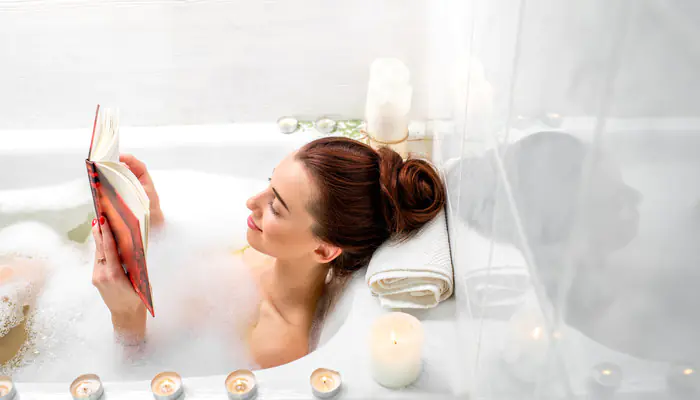
Hot baths have also been found to improve digestion and lower blood sugar levels, which is very beneficial for people with diabetes who find it difficult to maintain a healthy weight.
Improved bladder function
Benefits of a hot bath in treating urinary tract infections (UTI): Warm water actually helps the internal urethral sphincter relax. A bath reduces pain after surgery and can significantly reduce recovery time from illnesses.
Help for pregnant women
It is well known that immersing women in a warm bath during the early stages of labor can minimize both pain and stress. In some cultures, mothers bathe their newborns in water mixed with essential oils and herbs to speed up physical and mental recovery after childbirth.
Let's leave a few important notes. Hot bath - benefit or harm for men and women? Despite all the benefits, regular hot water immersions are not recommended for everyone, so before you make this a regular procedure, make sure that your immersions do not last more than 15-20 minutes each time. If you have cardiovascular disease, consult your doctor about taking hot baths. Avoid drinking cold drinks before a hot bath as this may reduce sweating. Also, such procedures are not recommended for pregnant women without appropriate medical advice.
What happens to the body while taking a bath
The effect of a bath on the body
First of all, it’s worth understanding what happens to the body while taking a bath. The mechanism of its beneficial effect on humans is complex and quite complex. It consists of three factors. This water pressure (hydrostatic effect), temperature (thermal effect) and water composition (chemical exposure). What follows from this?
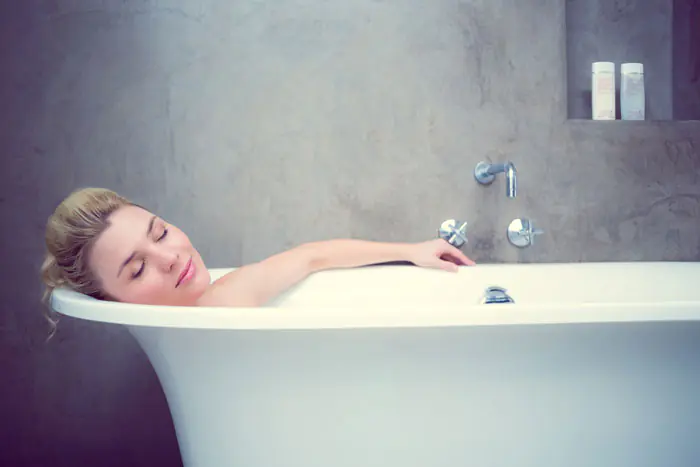
Firstly, when immersed in water, the human body is freed from the force of gravity, the buoyant force of water causes a feeling of weightlessness, while the musculoskeletal system is maximally unloaded, muscle tension is reduced, and the body relaxes.
Secondly, in this case, a redistribution of blood volume occurs with an increase in venous return to the heart and a decrease in congestion in the extremities - thus blood circulation is normalized, the work of the kidneys and respiratory muscles is activated.
Thirdly, in the bath, the pores open and cleanse, and the skin begins to fully perform its excretory and respiratory functions.
Fourthly, warm baths promote better penetration of chemicals dissolved in mineral water into the skin and internal organs, including oxygen, which have a healing effect.
A variety of drugs dissolved in water have a beneficial effect on the nervous system: tension decreases and the overall tone of the body increases. The use of various phyto-additives in bath water that can penetrate the skin and respiratory tract significantly enhances the therapeutic and prophylactic effect of this procedure. Essential oils have a particularly high penetrating ability - skin permeability for them is 100 times higher than for water. Baths with the addition of decoctions of various herbs give a good healing effect. Unless, of course, you have an allergy.
Fifthly, water, by acting on the body, relieves stress and improves mood, because during this procedure the level of stress hormones (adrenaline, norepinephrine, cortisol) in the blood decreases.
But that's not all. Depending on the temperature and the drugs added to the water, a bath can invigorate or soothe, relax or tone, treat and relieve pain and inflammation. These effects can be achieved in different ways and at different times of the day.
Types of baths
Based on water temperature, baths are divided into cold (up to +20°С), cool (up to +30°С), indifferent (+34-36°С), warm (up to +38°С), hot (above +39°C). The duration of the bath depends on its temperature and individual tolerance.
Short-lived cold baths have a general tonic effect, increase metabolism, stimulate the functions of the nervous and cardiovascular systems. Exposure time is from 1 to 4-5 minutes, depending on individual cold tolerance. Cool baths take 10-15 minutes.
Warm baths have a calming effect. The usual duration of such a bath is from 20 to 40 minutes.
Hot baths increase sweating and increase metabolism. But you cannot take them for longer than 15-20 minutes - this is a big burden on the heart. It is not recommended to take hot baths for a long time for people with heart disease and a tendency to hypotension (low blood pressure) and fainting.
After a hot bath, you should take a cool or contrast shower, ending the procedure with cold water.
It is worth talking separately about hot tubs. This bathtub is equipped with equipment that allows you to focus the water jet on certain areas of the body, like a manual massage. Increasing blood circulation, dilating blood vessels, lowering blood pressure - these are the main effects of hydromassage, not counting thousands of beneficial effects, such as muscle relaxation, increased oxygen levels and the penetration of nutrients into the body.
When can you take a bath? At any time of the day, you just need to take into account the effect of one or another bath.
It is better to take warm or hot baths before bed. They are able to calm the nervous system, relieve tension and fatigue after working days. In the morning, it’s good to take a cool, invigorating bath so that the body wakes up and fills with energy. The same effect can be achieved with a contrast shower.
Baths can be general action And medicinal. Baths general action there are relaxing, soothing, tonic, restorative. This is a general health procedure that does not have specific therapeutic goals. Therapeutic baths in modern medicine play an important role in the complex treatment of many diseases of the nervous, respiratory and vascular systems, musculoskeletal system and skin diseases.
Treatment with baths is usually carried out in a course of 12 to 30 procedures, daily or every other day - depending on individual tolerance.
Contraindications to hydrotherapy are severe diseases of the cardiovascular system, infectious diseases, neoplasms, bleeding, diseases of the blood and hematopoietic organs.
Bath additives
You can enhance the beneficial effects of water on the body using various additives.
Sodium chloride (salt) baths
Natural sea salt, dissolved in water, contains components necessary for the entire body. So, potassium regulates the nutrition of skin cells, calcium ensures normal blood clotting, magnesium promotes muscle relaxation, bromine calms the nervous system, iodine acts as an antiseptic (a substance with antimicrobial activity). A bath with salt tones and relaxes the body, relieves muscle pain, relieves fatigue, irritation, strengthens the nervous system, increases performance, and improves mood. In addition, this procedure activates metabolism, improves blood circulation, and promotes the healing of wounds and skin cracks. The effect of salt baths on the body depends on the concentration of the solution and the temperature of the water, as well as on the initial state of the person.
At home, it is best to prepare baths with a salt concentration of 1 g/liter. Along with table sea salt, table salt and lake salt preparations can be used for sodium chloride baths. The preparation of such baths is carried out according to the methods described on the packaging. If there are no special instructions, then 1 kg of table salt and 300 - 500 g of lake or sea salt should be dissolved in 100 liters of water (the capacity of a regular home bath). Recommended temperature + 37 - 40 °C. The bath is taken for 15-20 minutes, every other day, the course of treatment is 15-20 procedures. After the salt bath, you need to rinse in the shower.
Modern bath foams contain components that soften tap water. They also contain mild active cleansers and additional fats that are absorbed into the skin and cleanse it well. Foams, as a rule, are suitable for all skin types and contain aromatic additives, creating the effect of aromatherapy - the positive effect of odors on the body. Foams may contain plant extracts, I would like to draw your attention to some of them.
For example, bath foam with aloe vera tones the skin, refreshes the body, relieves irritation, and has an antiseptic effect. Thanks to the properties of aloe, the bath provides a good moisturizing effect for the skin, making it soft and elastic.
Foam with coconut very nutritious. Coconut perfectly tones and softens the skin. This bath will help you regain your strength.
Peach extract will relieve fatigue and irritability, have a softening and tonic effect on the skin.
To be surrounded by lush white foam, the cap of the product must be foamed under running water.
After a bubble bath, you need to rinse off in the shower.
Bath oil
Most often, cosmetic paraffin oil is used with additives - natural or synthetic essential oil and dyes. It can be in a gelatin shell in the form of various figures (gelatin dissolves in water). How much oil is required to prepare a bath is written on the packaging. Its main effect is aromatherapy. After such a bath you don’t need to rinse.
Baths with herbal supplements
Have a beneficial effect on the skin and the body as a whole herbal baths thanks to the vitamins, microelements, and phytoncides (substances that kill bacteria) contained in plants. In addition, inhaling the aromas of herbs calms the nervous system and helps with colds. Herbs for baths can be used in fresh and dried form - for decoctions, as well as in the form of tinctures and extracts - this is a special technology for processing raw materials, which preserves the beneficial properties of plants as much as possible.
The rules for preparing such baths are quite simple: add the appropriate extract (it can be purchased at a pharmacy) or decoction to a bath filled with fresh or salt (sodium chloride) water. It is prepared like this: pour 1.5 cups of a mixture of dry herbs with a liter of boiling water, boil in a water bath over low heat for 15-20 minutes, let it brew for two hours, strain and pour into the bath. It is better if the water in it is about +35 °C. After such a bath, you don’t need to take a shower.
Soothing herbal baths
In order to restore the nervous system, you can take a bath with the addition of a collection of herbs - valerian, oregano, linden blossom and calendula.
Well calms, relieves nervous tension, fatigue, improves sleep, helps with colds, a bath of yarrow, oregano, wormwood with the addition of pine buds.
Mint - relieves headaches, fatigue, nervous tension, skin irritation, cleanses pores.
Lavender - relieves fatigue, nervous tension, headaches, eliminates insomnia, muscle pain, helps cure the runny nose, inflammation of the respiratory tract and throat, and fungal skin diseases.
Sage - helps eliminate cough, bronchitis (inflammation of the bronchi), arthritis (inflammation of the joints), tension and muscle pain.
Eucalyptus - relaxes muscles, relieves pain, has an antiseptic effect.
The series - calms the nervous system, relieves fatigue, has anti-inflammatory and anti-allergic effects, and is used to treat some skin diseases.
If you don't have any herbs in the house, you can prepare a soothing lemon bath. It must be cut into thin slices, filled with warm water, allowed to brew for 2-3 hours and poured into a bath with a water temperature of +37-38°C.
After 20 minutes in such a bath, fatigue will disappear without a trace.
Toning baths
If you need to relieve fatigue before an important meeting, a bath with pine extract and a few drops of eucalyptus oil will help. The needles contain valuable biologically active substances: carotenoids, chlorophyll, vitamins E, K, D, F, and have bactericidal properties. The water should be warm enough - +35-36°C. Duration - no more than 5 minutes (further stay in warm water, on the contrary, relaxes). This bath restores strength well, gives vitality, and has an anti-inflammatory effect.
Inhaling pine essential oil has a beneficial effect on the respiratory system. But if you didn’t have time to buy it, it doesn’t matter. Can be used. New Year tree. Of course, if there was a real tree in the house. Before throwing it away, you need to collect all the needles and dry them. And then brew as needed. To do this, pour one glass of pine needles (250 g) with a liter of boiling water and leave for half an hour. The infusion can be poured into a bath with a water temperature of +35 - 37C. You should stay in it for no more than half an hour. It is best to immerse yourself in a pine bath before bed, when there are no other things planned, or after suffering stress, when you need to forget about all your worries.
But a bath with calamus extract will lift your spirits and invigorate you. Rosemary extract is also best added to your bath in the morning. It helps to activate all body functions, improves brain activity, stimulates the circulatory system, and has an antiseptic and wound-healing effect.
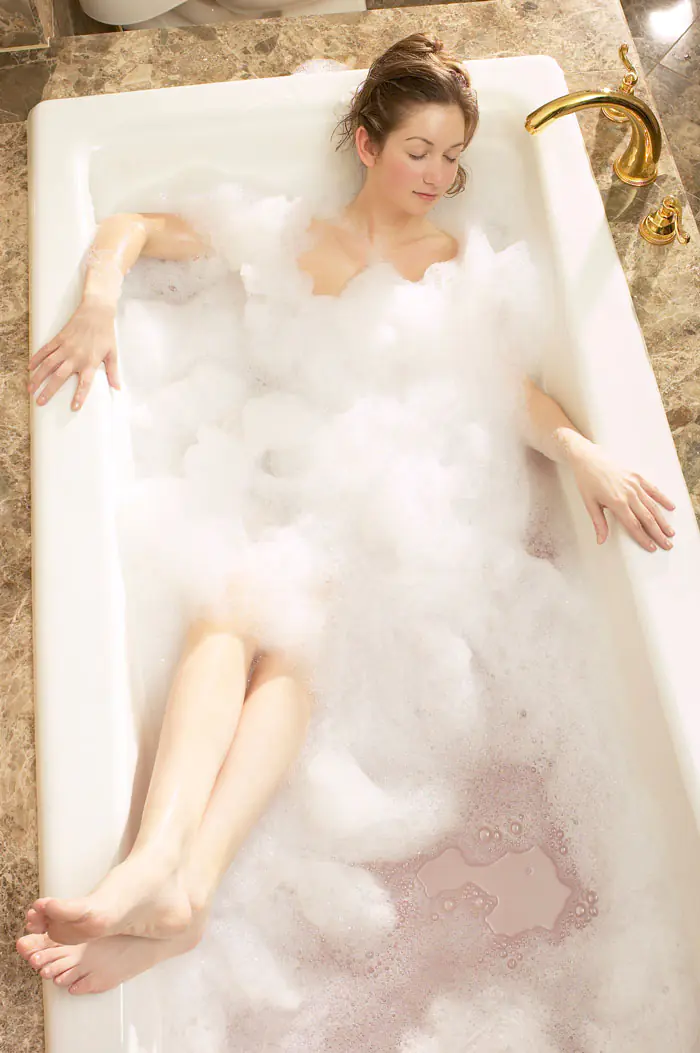
Restorative baths
It has long been known that birch brooms have a healing effect on the entire body, helping with joint pain and aching bones. But if you can’t go to the bathhouse, then you can limit yourself to a bath with an infusion of birch buds and leaves.
A bath with a decoction of a mixture of birch leaf, chamomile, nettle, burdock root, and string in equal proportions has a general strengthening effect.
In addition, you can use currant leaves, raspberries and oregano flowers. Their use will perfectly refresh the skin. The leaves are poured with boiling water to make a strong infusion and added to the bath. You need to take it for at least 10 minutes.
Baths for skin diseases
Celandine, chamomile and linden have long been famous for their healing properties in the treatment of skin diseases. They have a disinfectant, anti-inflammatory and wound healing effect. They are recommended for use if there are pustules or small wounds on the skin, but it is advisable to first consult a doctor about this. In addition, a bath with a decoction of birch buds, as well as a decoction of young spruce branches, which also has a general tonic effect, helps with inflammatory processes on the skin.
For dry skin it is best to take softening baths, for example with the addition of regular starch. It is pre-diluted in hot water - 100 g of starch per 10 liters of water. The water temperature should be +35-37°C. After this, it’s good to take a warm shower, gradually cooling the water. This procedure will perfectly refresh the skin. Instead of starch, you can use bran or gelatin.
For chapped, irritated, overly sensitive skin, a honey bath is useful (if there is no individual intolerance to honey). It is very simple to prepare: dissolve 3-4 tablespoons of honey in a liter of hot water (or milk) and pour into the bath. This solution has an anti-inflammatory, tonic and softening effect on the skin, rejuvenates it and makes it elastic.
Baths with essential oils
Essential oils are highly concentrated plant extracts obtained by steam distillation of flowers, seeds, berries, roots and other parts of medicinal herbs and plants. The aromatic volatile substances they contain can influence the body through olfactory nerve cells - receptors. Essential oils are effectively used in aromatherapy.
Each of the essential oil components has its own threshold of action, a precise concentration range in the air.
To prepare such a bath, you need to add only 5-15 drops of essential oil to the water (exactly how much should be written on the label; an unauthorized increase in the dose can lead to irritation or even a burn). The water temperature should correspond to the main goal: for relaxing, soothing oils - pleasantly warm, for tonic oils - from slightly cool to cold. The time spent in the bath should not exceed 20 minutes. Otherwise, a useful and pleasant event, at best, will not give the desired effect, and at worst, it will cause harm. There is no need to rinse with water after taking a bath.
For depression and just a bad mood, a bath with the addition of geranium or pine needle oil will help.
For freshness and elasticity of the skin, fir oil is added to the bath.
Rose oil has a tonic effect; in addition, it will help you relax after a busy day.
Juniper oil heals small wounds and helps in the treatment of pustular skin diseases.
Other Supplements
Glycerin baths have a good effect on the skin. They not only soften, but also perfectly refresh it. A glycerin bath is prepared as follows: the bath is half filled with water, and 200 grams of glycerin are added there. Then water is added to the required level and another 200 grams of glycerin is poured in. After a few minutes, you can take a bath, but you should stay in it for no more than 20 minutes. At the end of the procedure, rinse well under a warm shower.
A truly magnificent remedy is a bath with the addition of milk or entirely consisting of it. Milk has a whole range of elements and vitamins that are beneficial not only for the skin, but also for the nervous system. Vitamin B, contained in large quantities, eliminates sagging and fatigued skin, vitamin E rejuvenates and has a regulating effect. Not every woman can buy enough milk to fill a bath, so you can use a more optimal recipe: two liters of milk (preferably fresh and warm), mix with four tablespoons of honey and leave for ten minutes.
At this time, fill the bath one third with water and pour a glass of table salt into it. Wait until it dissolves in water and pour milk and honey into the bath. The water temperature should not exceed +35°C, otherwise it can harm the cardiovascular system.
Hot baths.
Recommended for women in good health. The water temperature ranges from 37 to 42 C. The maximum stay time is no more than 10-15 minutes. Such a bath can only be done in the evening. It fights colds, soothes, relieves daytime fatigue, relaxes muscles and prepares well for sleep. For better tolerability of a hot bath during immersion, the water temperature should be about 37 C, and then it is gradually raised to 40-42 C by slowly adding hot water to the end of the bath where the feet are.
Cool bath.
The most comfortable procedure, suitable for everyone without exception. The optimal mode is 33-36 C. The time spent in such a bath is not limited if you maintain the original temperature.



